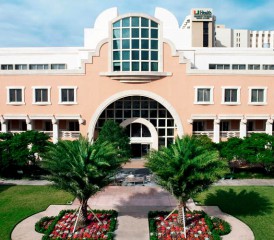Villamizar Leads Mesothelioma Multidisciplinary Clinic in Miami
Treatment & DoctorsWritten by Sean Marchese, MS, RN | Edited By Walter Pacheco

Since joining the Sylvester Comprehensive Cancer Center in 2014, thoracic surgeon Dr. Nestor Villamizar has been building one of the nation’s premier treatment centers for patients in South Florida.
Villamizar previously worked in Boston at Brigham and Women’s Hospital, where he collaborated closely with renowned thoracic surgeon and mesothelioma specialist Dr. David Sugarbaker.
“We’re doing a lot of things now that we brought from Boston,” Villamizar said. “We want those patients in Florida to have the opportunity to stay close to home and get the same great care.”
At Sylvester Comprehensive Cancer Center, part of the University of Miami Health System, Villamizar has worked to expand the only NCI-designated Comprehensive Cancer Center in South Florida. Over 4,400 new cancer patients receive treatment at Sylvester every year, and Villamizar’s team now treats all types of thoracic tumors.
“Families shouldn’t have to journey across the country to receive high-quality care for mesothelioma,” said Villamizar. “That kind of trip is challenging for the mesothelioma patient.”
A multitude of clinical trials are also ongoing for pediatric and adult cancers, and a clinical trial matching service helps patients find appropriate mesothelioma clinical trials in South Florida and across the country.
With a fully realized multidisciplinary team now in place, mesothelioma patients in South Florida have access to the newest and best options for treatment at Sylvester.
Virtual Multidisciplinary Clinic at Sylvester
In addition to Villamizar’s vast experience with advanced surgical procedures, a team of mesothelioma specialists works to provide appropriate and specific treatment to each mesothelioma patient using many other modalities.
Multidisciplinary care teams focus on specific cancer types and draw expertise from various kinds of physicians, including surgeons, pathologists, radiation oncologists and medical oncologists. These groups meet regularly to discuss treatment strategies and ongoing concerns for each of their patients.
“Mesothelioma has a high recurrence rate and certainly benefits from multidisciplinary care,” said Villamizar. “So far, we have used systemic chemo for induction versus adjuvant in addition to heated chemo during surgery, SBRT [stereotactic body radiation therapy] for local recurrence, and now TTF [Tumor Treating Fields] and immunotherapy.”
Villamizar works closely with Dr. Alan Dal Pra, a radiation oncologist, and Dr. Lawrence Negret, a medical oncologist, during multidisciplinary clinics.
Improving Doctor-Patient Communication During COVID-19
Since the COVID-19 outbreak, Villamizar and his team have adapted to the challenges of the pandemic using a novel virtual approach.
Through the use of web conferencing and video calls, Villamizar and the multidisciplinary team at Sylvester meet with their patients to discuss treatment plans and upcoming procedures.
“Anything that involves education and counseling about findings and treatment plans is better online because we can have multiple providers present at the same time,” said Villamizar.
“We can share our computer screen to review images and also to review online content, including surgical videos, diagrams, publications and more,” Villamizar explained. “Patients could be in the comfort of their home with all family members around during discussion, and they can all ask questions.”
Innovative Treatments at Sylvester Provide New Options
The advantage of a dedicated team for treating mesothelioma is the ability to provide exciting new treatment options to patients.
Systemic chemotherapy is one of the most common mesothelioma treatment options and is typically delivered through an IV. Hyperthermic intrathoracic chemotherapy is a process that allows surgeons to soak the chest cavity with chemotherapy drugs after they have removed all visible cancer growth.
This procedure aims to kill any cancer cells remaining after the surgery, similar to the HIPEC procedure used to treat peritoneal mesothelioma.
When combined with other therapies, such as radiation or systemic chemotherapy, Villamizar and his team have seen results comparable to the gold standards of mesothelioma treatment.
“I have three recent post-op pleurectomy with heated chemotherapy patients who are recovering well after adjuvant chemotherapy,” said Villamizar. “It’s a big surgery to recover from, but so far, so good.”
Additionally, the multidisciplinary team at Sylvester Comprehensive Cancer Center is one of the first health care teams to prescribe Tumor Treating Fields for their patients. The therapy was recently approved by the FDA to treat metastatic and unresectable disease in combination with chemotherapy.
Tumor Treating Fields uses alternating electrical currents of a low frequency to disrupt cancer proteins essential in cellular division. A personal device delivers these electrical currents through adhesive arrays attached to the skin, preventing cancer from growing and spreading.
For now, the scope of treatment for TTFields remains narrow and is an option only for patients with advanced disease.
However, Dr. Villamizar and his team are looking toward the future of multidisciplinary care for mesothelioma patients. They believe that treatments such as TTFields and immunotherapy hold the key to long-term results, improved survival and a better quality of life.
Dr. Alan Dal Pra also contributed to this article.






